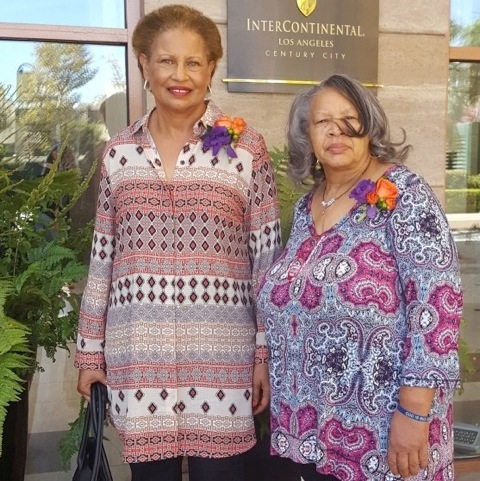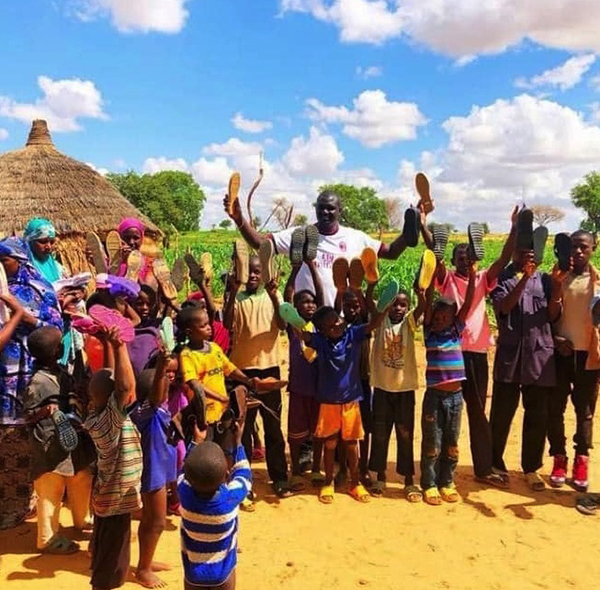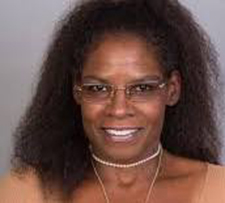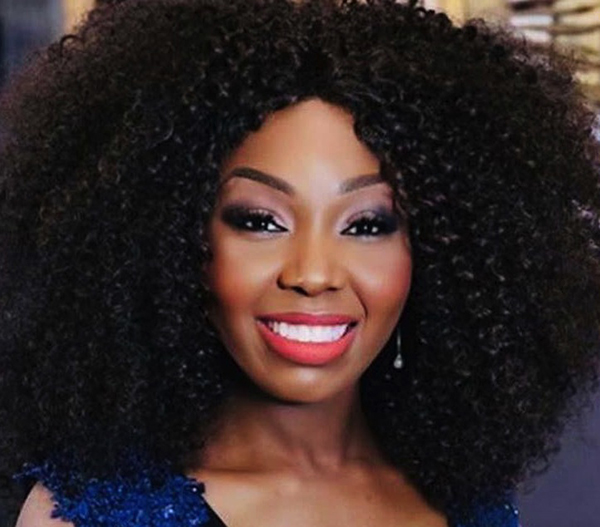MAKING A DIFFERENCE
By Darlene Donloe
Contributing Writer
On a sunny Saturday morning last month about 40 caregivers gathered in Kenneth Hahn Park for the first time since February 2020 to fellowship and share stories about their experiences managing the lives of their loved ones who have been diagnosed with Alzheimer’s or some other form of dementia.
The event was hosted by Actively Caring Through Sharing (ACTS), a support group for caregivers founded in 2014 by sisters Jeanie Harris and Sharon R. Melancon, after the experience they had taking care of both their 95-year-old mother, Peggy Melancon, and a cousin they affectionately called Aunt Lorraine, 94, both of whom had dementia and are now deceased.
To meet Harris and Melancon is an experience unto itself. Even if these Los Angeles natives don’t know you personally, they greet you with a kind, sincere hug and insist you are now part of their family.
Harris, 72, and Melancon, 67, both have upbeat personalities, infectious smiles, hearty laughs and good-natured spirits that bring warmth and comfort to members who often spend stressful days taking care of loved ones.
The sisters, who love to reminisce and tell stories about how they managed to take care of their mother through a difficult time, lovingly finish each other’s sentences and frequently interrupt the other to co-sign a story or add a memorable or deleted detail.
“ACTS is an organization that is helping people with resources and educational material from a real-life experience,” Harris said. “We have actually lived what we are trying to do to help others. We know what people are going through. When we were going through it, we learned that people need to have their legal affairs in order. People need to talk about trustees and conservatorships. All of that is important. You have to be prepared.”
“We’re a support group for past, present and future caregivers,” said Melancon, who helped take care of her mother and cousin for about six years. “We try to be full service. We want to be a ‘one-stop-shop.’”
Melancon said the organization provides encouragement, free educational resources, support and “a safe place for caregivers to share their true feelings.”
ACTS meets every third Saturday of the month and provides free educational resources through literature, a lending library and also offers a variety of speakers like Dr. Jarrod Carrol, a noted memory loss specialist at Kaiser Permanente, and other health professionals with topics that cover making a home safe, Social Security and Medicare, caregiving from a male perspective, getting your legal affairs in order and what you need to know about home care versus placement.
“We want to provide support and a safe place for caregivers to share their true feelings,” Melancon said. “We also do fun things with caregivers like going to see shows like, the Temptations. Alzheimer’s is the granddaddy of them all. It’s stressful. We tell caregivers they need to take time out for themselves.”
“Alzheimer’s is a debilitating disease,” said Harris, a mother of two sons, one daughter and five grandchildren. “You are grieving the loss of your loved one while they are here. Tuesday mommy went to bed and Wednesday she woke up and we had a brand new mother. That’s what happens. It happens just that quick.”
“It’s a terrible, dreadful disease that takes the person that you know and love away from you,” Melancon said. “At the same time, caregivers are also going through something. I suffered from depression. I needed to get a break because I had a history of depression.
“So, that’s when my sisters stepped in and allowed me to take a much-needed break. Vivian (Edwards), our other sister who also cared for our mother, would step up when we needed a break as would Jeanie’s daughter Kim (Harris), who has been very supportive.”
Harris said caregivers have to learn to take care of themselves first.
“We can tell you that from experience,” she said. “No one could take care of mommy better than I could take care of my mother. But I still needed to take a break.”
“Everybody asked us how our mother was doing,” Melancon. “Nobody asked us how we were doing. No one asks about the caregiver. We were falling apart.”
Harris and Melancon, who both agree they could do more if they had their own building, said they started noticing subtle differences in their mother and Aunt Lorraine, especially their attire and their untidy homes.
“Mom was a sharp dresser,” Melancon said. “Mom started losing her keys. Things started changing. I noticed her place wasn’t being kept. The same with Aunt Lorraine. Her appearance was a clue. I noticed her teeth. She wasn’t kept up.”
“There was no life in mommy’s eyes,” said Harris, who retired from a job in law enforcement. “It was like the life had been sucked out. These are the kinds of things you need to look out for.”
Wendy McKnight, 52 has been taking care of her mother, Otha Moore, 82 for about six years. She recognized “something different” in her mother in 2013.
“Today, there are times she doesn’t know me,” McKnight said. “She refers to me as her sister. It doesn’t bother me. I consider it an honor to take care of my mother who now lives with me. ACTS has helped me so much. Sometimes it’s good to just be around people who understand what you’re going through.”
When their cousin and mother were diagnosed, Harris and Melancon admitted they cried and were devastated. They didn’t know what to do, but they eventually figured it out.
“We didn’t really have a choice,” Melancon said. “We had to figure it out and figure it out quick. That’s why we started this nonprofit. We didn’t want anyone else to have to go through what we went through. There is a lot you have to do. A lot to consider. You really become that loved one’s caregiver. It’s no joke.”
Harris and Melancon “self-fund” ACTS.
“We believe in what we are doing,” Melancon said. “We don’t take any salary. ACTS has six permanent monthly donors. Every month we give out a gift card for $350 to a caregiver for whatever they need. We know what it’s like when you need a little extra.”
ACTS, which is open to anyone, has helped caregivers with car rentals, obtaining wheelchair ramps, diapers and even monthly fees at nursing facilities.
Harris’ son donated 100,000 airline miles so they can transport caregivers or members of their families without it being a financial burden to them.
“We wanted to help people in a tangible way,” Harris said. “In the beginning, we didn’t know how we were going to do what we wanted to do. There was no information in the Black neighborhood on how to deal with Alzheimer’s. We figured it out.
“Now people come to us because they know we have the information,” she added. “We work with Petra Niles at Alzheimer’s LA who provides us with a lot of information and pamphlets. We also partner with various agencies. Now that we know what to do, we want to do more.”
Harris said there are limited support groups in the Black community.
“A lot of Black people are overwhelmed with caregiving,” she said. “They don’t know where to turn. People say they wish they had known about us sooner, or that they knew we even existed. We want people to know they’re not alone. We understand what they are going through is important.
In fact, it’s critical. It’s critical for people to have someplace to go. There are resources, but no one knows about them. There are places to go, but no one knows where. We need more support in the community.”
“We get calls throughout the week,” said Melancon. “We’re here if they need us
Melancon said some Black people don’t come forward for help because of pride.
“Black people are in denial,” she said. “We’re in denial about a lot of things. It’s our culture. Don’t tell anybody your business. To some, it’s embarrassment and shame to need help or to have to deal with something mental.”
Harris doesn’t necessarily agree.
“I don’t know if it’s our culture,” she said. “A lot of people just don’t realize what dementia is. They keep the blinders on.”
ACTS can be reached at (323) 296-2975, email: acts@actscsg.org and actscsg.org.
“Making a Difference” is a weekly feature profiling organizations that are serving their communities. To propose a “Making a Difference” profile, send an email to newsroom@wavepublication.com.
This article was produced as part of a project for the USC Annenberg Center for Health Journalism California Fellowship.
Darlene Donloe is a freelance reporter for Wave Newspapers who covers South Los Angeles. She can be reached at ddonloe@gmail.com.













